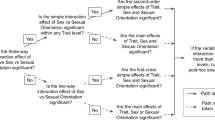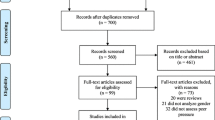Abstract
Six areas of research in developmental and personality psychology concerning sex-typed traits, attitudes, and interests are identified as elements of a common “masculinity-femininity” paradigm needing reexamination. The masculinity-femininity paradigm is defined in relationship to Money and Ehrhardt's model for gender identity differentiation and dimorphism. The six lines of research in the masculinity-femininity paradigm are then briefly critically examined: (1) the measurability of masculinity-femininity as a trait, (2) the identification model of masculinity-femininity development, (3) the effects of father absence on boys, (4) correlates of masculinity-femininity in life adjustment, (5) cross-sex identity in males, and (6) sex role identity problems in black males. The empirical and conceptual problems in each line of research are explored, and are substantial enough to suggest the need for alternate paradigms. Two alternate models for masculinity-femininity development are briefly sketched. First, masculinity-femininity development is analogized to moral development, as a phasic process ideally leading to sex role transcendence and androgyny. Second, the acquisition of masculinity-femininity is analogized to language acquisition, as a highly symbol-dependent learning process contingent upon the interaction between an innate acquisition apparatus and a corpus of observed sex role behavior.
Similar content being viewed by others
References
Adorno, T. W., Frenkel-Brunswick, E., Levinson, D., & Sanford, R. N. The authoritarian personality. New York: Harper, 1950.
Bem, S. Psychology looks at sex roles: Where have all the androgynous people gone? Paper presented at UCLA Symposium on Women, May, 1972.
Bem, S. The measurement of psychological androgyny. Journal of Clinical and Consulting Psychology 1974, 42 155–162.
Bem, S. Sex-role adaptability: One consequence of psychological androgyny. Journal of Personality and Social Psychology 1975, 31 634–643.
Bezdek, W., & Strodtbeck, F. Sex role identity and pragmatic action. American Sociological Review 1970, 35 491–502.
Biller, H. Father absence and the personality development of the young child. Developmental Psychology 1970, 2 181–201.
Biller, H. Father, child, and sex role. Lexington, Massachusetts: Heath Lexington, 1971.
Block, J. Conceptions of sex role: Some cross-cultural and longitudinal perspectives. American Psychologist 1973, 28 512–526.
Chomsky, N. Aspects of the theory of syntax. Cambridge, Massachusetts: M.I.T. Press, 1965.
Constantinople, A. Masculinity-femininity: An exception to a famous dictum? Psychological Bulletin 1973, 80 389–407.
Edwards, A., & Abbott, R. Measurement of personality traits: Theory and technique. Annual Review of Psychology 1973, 24 241–278.
Franck, K., & Rosen, E. A projective test of masculinity-femininity. Journal of Consulting Psychology 1949, 13 247–256.
Hacker, H. The new burdens of masculinity. Marriage and Family Living 1957, 3 227–233.
Hannerz, U. Roots of black manhood. Transaction 1969, 7(11), 14–18.
Hannerz, U. What ghetto males are like: Another look. In N. Whitten and J. Szwed (Eds.), Afro-American Anthropology: Contemprary Perspectives. New York: Free Press, 1970.
Hannerz, U. Soulside. New York: Columbia University Press, 1971.
Hare, N. The frustrated masculinity of the Negro male. In R. Staples (Ed.), The Black Family: Essays and Readings Belmont, California: Brooks-Cole, 1971.
Harford, T., Willis, C., & Deabler, H. Personality correlates of masculinity-femininity. Psychological Reports 1967, 21 881–884.
Harlow, R. Masculine inadequacy and the compensatory development of physique. Journal of Personality 1951, 19 312–233.
Harrington, C. Errors in sex-role behavior in teen-age boys. New York: Teachers College Press, 1970.
Hartley, R. Children's concepts of male and female roles. Merrill-Palmer Quarterly 1959–60. 6 83–91.
Hartley, R. American core culture: Changes and continuities. In G. Seward & R. Williamson (Eds.), Sex Roles in changing society. New York: Rand McNally, 1968.
Herzog, E., & Sudia, C. Boys in fatherless families (DHEW Publ. No. (OCD) 72-33). Washington, D.C.: U. S. Government Printing Office, 1970.
Howell, M. Employed mothers and their families (I). Pediatrics 1973, 52 252–263. (a)
Howell, M. Effects of maternal employment on the child (II). Pediatrics 1973, 52 327–343. (b)
Jenkin, N., & Vroegh, K. Contemporary concepts of masculinity and femininity. Psychological Reports 1969, 25 679–697.
Knox, W., & Kupferer, H. A discontinuity in the socialization of males in the United States. Merrill-Palmer Quarterly 1971, 17 251–261.
Kohlberg, L. A cognitive-developmental analysis of children's sex role concepts and attitudes. In E. Maccoby (Ed.), The development of sex differences. Stanford: Stanford University Press, 1966.
Kohlberg, L. Moral development. In D. Sills (ed.), International Encyclopedia of the Social Sciences. New York: Macmillan, 1968.
Kuhn, T. The structure of scientific revolutions. Chicago: University of Chicago Press, 1962.
Lipman-Blumen, J. How ideology shapes women's lives. Scientific American 1972, 226(1), 34–42.
Lipsitt, P., & Strodtbeck, F. Defensiveness in decision-making as a function of sex-role identification. Journal of Personality and Social Psychology 1967, 6 10–15.
Lynn, D. Divergent feedback and sex-role identification in boys and men. Merrill-Palmer Quarterly 1964, 10 17–23.
MacEwan, P. Liberating young children from sex roles: Experiences in day care centers, play groups, and free schools. Boston: New England Free Press, 1972.
Miller, D., & Swanson, G. Inner conflict and defense. New York: Henry Holt, 1960.
Mischel, W. Sex-typing and socialization. In P. Mussen (Ed.), Carmichael's Manual of Child Psychology (Vol. 2, 3rd ed.). New York: Wiley, 1970.
Money, J., & Ehrhardt, A. Man and woman, boy and girl. Baltimore: Johns Hopkins, 1972.
Mussen, P. Some antecedents and consequents of masculine sex-typing in adolescent boys. Psychological Monographs 1961, 75 (Whole No. 506).
Mussen, P. Long-term consequents of masculinity of interests in adolescence. Journal of Consulting Psychology 1962, 26 435–440.
Mussen, P. Early sex-role development. In D. Goslin (Ed.), Handbook of socialization theory and research. New York: Rand McNally, 1969.
Osofsky, J., & Osofsky, H. Androgyny as a life style. Family Coordinator 1972, 21 411–419.
Pettigrew, T. A profile of the Negro American. Princeton, New Jersey: Van Nostrand, 1964.
Rosenberg, B., & Sutton-Smith, B. A revised conception of masculine-feminine differences in play activities. Journal of Genetic Psychology 1960, 96 165–170.
Rosenberg, B., & Sutton-Smith, B. Ordinal position and sex-role identification. Genetic Psychology Monographs 1964, 70 297–328.
Russell, D. Rape and the masculine mystique. Paper presented at the American Sociological Association, New York, August, 1973.
Rychlak, J., & Legerski, A. A sociocultural theory of appropriate sexual role identification and level of personality adjustment. Journal of Personality 1967, 35 31–49.
Sanford, R. Masculinity-femininity in the structure of personality. In Sanford, Self and Society. New York: Atherton, 1966.
Seifert, K. Some problems of men in child care center work. Child Welfare 1973, 102 167–171.
Sexton, P. The feminized male: Classrooms, white collars, and the decline of manliness. New York: Random House, 1969.
Sherriffs, A., & McKee, R. Qualitative aspects of beliefs about men and women. Journal of Personality 1957, 25 451–464.
Siegel, A., Stolz, L., Hitchcock, E., & Adamson, J. Dependence and independence in children. In F. Nye & L. Hoffman (Eds.), The employed mother in America. New York: Rand McNally, 1963.
Slater, P. Toward a dualistic theory of identification. Merrill-Palmer Quarterly 1963, 7 113–126.
Strodtbeck, F., & Creelan, P. Interaction linkage between family size, intelligence, and sex-role identity. Journal of Marriage and the Family 1968, 30 301–307.
Strodtbeck, F., Bezdek, W., & Goldhammer, W. Male sex role and response to a community problem. Sociological Quarterly 1970, 11 291–306.
Terman, L., & Miles, C. Sex and personality. New York: McGraw-Hill, 1936.
Toby, J. Violence and the masculine mystique: Some qualitative data. The Annals 1966, 36(4), 19–27.
Tyler, L. Individual differences: Sex differences. In D. Sills (Ed.), International Encyclopedia of the Social Sciences. New York: Macmillan, 1968.
Vincent, C. Implications of changes in male-female role expectations for interpreting M-F scores. Journal of Marriage and the Family 1966, 28 196–199.
Vontress, C. The black male personality. Black Scholar 1971, 2(10), 10–17.
Williams, J. Sexual role identification and personality functioning in girls: A theory revisited. Journal of Personality. 1973, 41 1–9.
Young, F. Initiation ceremonies: A cross-cultural study of status dramatization. Indianapolis, Indiana: Bobbs-Merrill, 1965.
Author information
Authors and Affiliations
Rights and permissions
About this article
Cite this article
Pleck, J.H. Masculinity—Femininity. Sex Roles 1, 161–178 (1975). https://doi.org/10.1007/BF00288009
Issue Date:
DOI: https://doi.org/10.1007/BF00288009




